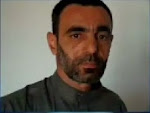Thursday, November 26, 2009
Rights group appeals psychic's 'witchcraft' death sentence
Donna Abu-Nasr
Associated Press
RIYADH: Saudi Arabia should overturn a death sentence imposed on a Lebanese national convicted of practicing witchcraft during a visit to the conservative kingdom, an international human rights group said in a report late Tuesday. Human Rights Watch also called on the Saudi government to halt “its increasing use of charges of ‘witchcraft,’ crimes that are vaguely defined and arbitrarily used.”
The report exposed the ongoing complaints over the Saudi justice system, which, while based on Islamic law, leaves a wide leeway to individual judges and can often result in dramatically inconsistent sentences.
Ali Sibat, a Lebanese psychic who made predictions on a satellite TV channel from his home in Beirut, was arrested by religious police in the holy city of Medina during a pilgrimage there in May 2008 and then sentenced to death on November 9 of the same year.
Sibat is one of scores of people arrested every year in the kingdom for practicing sorcery, witchcraft, black magic and fortune-telling, local papers reported. These practices are considered polytheism by the government of this deeply religious Muslim country.
No officials could be reached to comment on Sibat’s case or offer information on how many death sentences have been issued in witchcraft-related cases. Government offices in the kingdom are closed for the Muslim Eid al-Adha holiday.
The Human Rights Watch report presented a series of cases in the country, including that of Saudi woman Fawza Falih, who was sentenced to death by beheading in 2006 for the alleged crimes of “witchcraft, recourse to jinn [supernatural beings],” and animal sacrifice.
On November 2, 2007, Mustafa Ibrahim, an Egyptian pharmacist, was executed for sorcery in Riyadh after he was found guilty of having tried “through sorcery” to separate a married couple, said Human Rights Watch.
In another case, a criminal court in the western seaport city of Jiddah convicted Eritrean national Mohammad Burhan in October 2006, for being a “charlatan,” based on a leather-bound personal phone booklet containing writing in Eritrea’s Tigrinya alphabet.
He was sentenced to 20 months in prison and 300 lashes, and then was deported after serving more than double the time in prison.
“Saudi judges have harshly punished confessed ‘witches’ for what at worst appears to be fraud, but may well be harmless acts,” Sarah Leah Whitson, Middle East director at Human Rights Watch, said. “Saudi judges should not have the power to end lives of persons at all, let alone those who have not physically harmed others.”
Saudi Arabia has no penal code and in almost all cases judges have the discretion to define acts they deem criminal and to set punishments. The rights group said it asked a high-ranking official in the Justice Ministry last year to clarify the definition of the crime of witchcraft in Saudi Arabia and the evidence necessary for a court to prove such a crime.
“The official confirmed that no legal definition exists and could not clarify what evidence has probative value in witchcraft trials,” said the group.
Sibat, 46, was in Saudi Arabia to perform the minor pilgrimage known as omra. He started out in the holy city of Mecca and then traveled to Medina to pray at the Mosque of the Prophet.
At the Medina hotel, members of the religious police who enforce the kingdom’s strict Islamic lifestyle spotted Sibat, said his lawyer, May al-Khansa.
“He was the most popular psychic on the channel,” she said. “The number of callers, including from all over the Gulf, spiked in number when he appeared.”
“He was told if he confessed to witchcraft, he would be released and allowed to return to Lebanon,” she added.
In Lebanon, psychics, fortune-tellers and astrologers operate freely. Many have regular television and radio shows and some cafes even hire them to attract more customers. Every December 31, they jostle for air time to give their predictions for the new year.
Khansa said Sibat was “caught in the act” of performing witchcraft, but no one else has been arrested in the case.
Copyright (c) 2009 The Daily Star
Thursday, November 26, 2009
Subscribe to:
Post Comments (Atom)

Il y a des nouvelles ? Are there news ???
ReplyDeleteAli Sabat MUST be set free. The regime in Saudi Arabia is UNISLAMIC. Pure Islam does give anybody the right to take a life from somebody on this basis. It stipulates very clearly in the Qu'ran that if Islam is not in our hearts, that is between the individual and God.
ReplyDeleteCan someone please tell me what the law is regarding this? Under what law can Saudi Arabia arrest and convict a foreign national for practising something that is legal in his own country but illegal under Saudi law. Did he practice 'sorcery' whilst in Saudi? The evidence doesn't seem all that apparent? I pray Ali Sabat will be released.
ReplyDeleteMaybe he should tell them he is a fraud and not a physic and this wouldn't happen. There is no such thng as Allah, God or magic, so it would be impossible for him to have powers. Physics apply to everything in the Universe, there is no room for magic or god. FACTS MAKE THE WORLD GO ROUND.
ReplyDeleteThis is Middle Ages. Hunting for witches. If penalty is held, then Saudi Arabia will prove to backward state. In my country, many students from Saudi Arabia go to university. I went to them will be treated as backward medieval people. I pray for Ali Sabat and his speedy release.
ReplyDelete